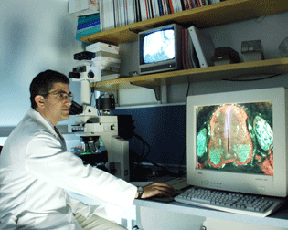
For the first time, researchers have identified genes in the human brain that could be responsible for most forms of pediatric epilepsy.
The findings, reported in the Annals of Neurology, the official journal of the American Neurological Association, may lead to new methods of diagnosing and treating the disease which affects an estimated 2 million Americans - about one out of every 100 people.
Epilepsy occurs in both children and adults. The disorder is marked by excessive electrical signals in the brain causing sudden, involuntary seizures that can mimic anything the brain does normally. Seizures range from changes in emotions and senses, such as taste, smell, vision, and hearing, to violent whole-body convulsions.
In the study, investigators monitored the brain activity of 17 patients, ages 6 months to 15 years, during seizures. Using electroencephalography, they identified the seizure's epicenter and compared it with adjacent, nonepileptic regions exhibiting more normal activities.
Because the patients had not responded previously to antiepileptic drugs, each required surgery to remove epileptic brain tissue and adjacent regions - standard practice to curing the seizures.
To determine differences between the epileptic and nonepileptic brain tissue, the researchers compared the genetic information of both. Of thousands of possible genes, only 11 consistently characterized the epileptic brain.
These included four genes, EGR-1, EGR-2, c-fos and MKP-3, associated with heightened levels of learning and memory in animals. This finding suggests that epileptic brain regions are "too smart" - that they perform normal brain functions, but to an extreme degree.
Because the study compared seizure location and changes in gene expression within each patient, the results ignore confounding effects of biological and genetic differences among patients and likely apply to most forms of the disease.
"One of the major limitations in developing effective treatments for patients with epilepsy is the lack of specific targets to prevent or stop the disease," says Jeffrey Loeb, M.D., Ph.D., associate professor of neurology and the Center for Molecular Medicine and Genetics at Wayne State University School of Medicine and senior author on the study.
"We've only opened the door," he says, "but the results are clearly relevant in developing new diagnostic and treatment approaches. These genes can help us define more precisely the specific area of the brain requiring surgery and guide us toward developing new, highly-effective, targeted drug therapies."
While epilepsy is more common than Parkinson's disease and multiple sclerosis, it receives less public attention. For its victims, however, seizures can occur hundreds of times a day, last several minutes at a time, and can result in a lifelong disorder often beginning in childhood.
For some 70 percent of its victims, the cause is unknown. Rare forms of epilepsy run in families though, because most result from brain insults including even minor sports-related head injuries, anyone can develop the debilitating disease.;
In others, seizures are caused by brain scarring, infections such as meningitis, tumors, surgery, stroke, and Alzheimer's and related diseases. They can be triggered by stress, lack of sleep, infection, alcohol, certain medications and, in children, fevers.
Dr. Loeb notes that, as with most illnesses, prevention is key. Children and their parents should wear seatbelts in automobiles and helmets when riding bicycles, skiing and engaging in other physical activities.
Most of the patients who participated in this research study improved significantly following surgery at the Comprehensive Epilepsy Program at Children's Hospital of Michigan .
The work involved researchers from Wayne State University School of Medicine departments of neurology, pediatrics, computer science, radiology and neurosurgery, its Center for Molecular Medicine and Genetics, and the Michigan Center for Biological Information.
It was supported financially by the Ralph Wilson Medical Research Foundation, the National Institute of Neurological Disorders and Stroke, and the Epilepsy Foundation of America.